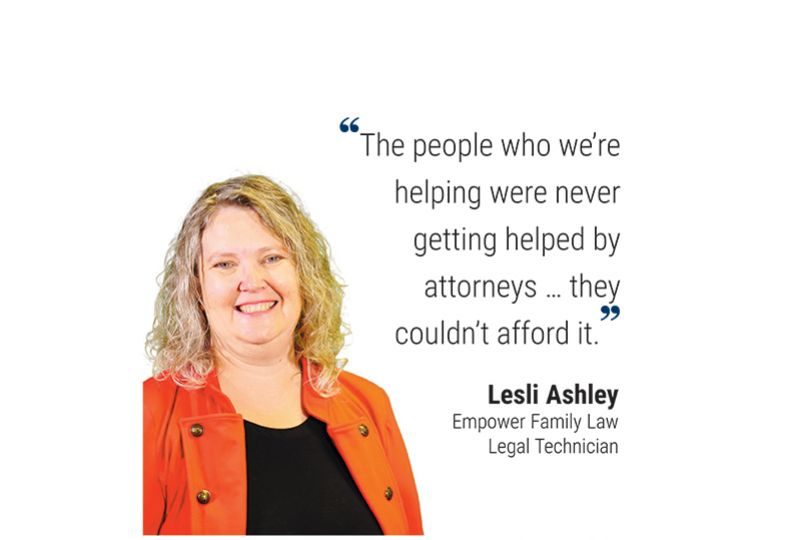
Home » Lame-duck legal tech profession is in demand
Lame-duck legal tech profession is in demand
Two years after Supreme Court quashes profession, those still in field experience surge in clients

September 28, 2023
A niche legal profession is shrinking in Washington state due to a state Supreme Court ruling that eliminated the certification of nonlawyer professionals to become limited license legal technicians. The decision to end the program two years ago has resulted in expanded demand for those already working in the profession.
Lesli Ashley, owner of Empower Family Law Legal Technician, says the need for family law legal assistance has continued to grow in the three years since she started her business. The Spokane area is recovering from a backlog in the family courts that’s creating opportunities to expand services for the self-employed LLLTs.
There are 94 active LLLTs in the state of Washington and 11 in Spokane County currently, according to figures from the Washington state Bar Association.
“I’m hopeful they’ll revive that (program) because I think that was a short-sighted decision,” says Ashley.
Washington was the first state in the U.S. to authorize LLLTs to deliver legal services in January 2013, according to the Washington state Bar Association website. The program lasted only seven years before the state Supreme Court decided to end the LLLT program in June 2020.
Eliminating the certification program for LLLTs came as a shock to Ashley. She says, “It was a complete surprise to everybody.”
Before the state Supreme Court’s decision to sunset the LLLT program was announced, the Washington state Bar Association submitted an annual report to the courts in April 2020 outlining how to expand LLLT assistance to include two new practice areas: administrative law and evictions and debt collection.
The expanded areas of practice could have helped the LLLT program attract people to the profession and to become financially self-sustaining through a modified fee structure and other avenues to raise revenue, the report states.
However, two months after the report was given to the courts, the decision to close the program was announced—attributed to declining interest in the profession and growing costs associated with sustaining the program, according to a response from the state Supreme Court issued in June 2020.
Ashley says the decision to end the LLLT program also was influenced by some attorneys who view LLLTs as competitors for family law clients.
“People made an assumption that legal technicians were somehow offering a lower level of justice to people than attorneys,” she says. “The people who we’re helping were never getting helped by attorneys anyway because they couldn’t afford it.”
She adds, however, “Not all attorneys feel like that.”
Attorney Scott Streed, owner of Northwest Legal Resolution Center, says working with LLLTs has been beneficial for both his clients and for his practice.
Streed operates a law office located at 620 N. Argonne, in Spokane Valley, in a shared space that also holds three independent LLLTs, one of which is Ashley’s company, Empower Family Law, he says.
“We all have our own separate business entities, but we office share,” Ashley explains.
The working arrangement allows Streed and the LLLTs to coordinate on shared cases and split office expenses, resulting in lower legal expenses for Streed’s clients.
“There’s a greater ability to rely on the work they do,” he says. “The advantage to me is I have competent people that I can work with that I could depend on to get the job done properly.”
Northwest Legal Resolution Center contracts with the three LLLTs in the shared co-working space where the legal technicians help draft documents, contact clients, and schedule and confirm hearings for the attorney.
Working with an LLLT provides clients with considerable savings compared to hiring an attorney to represent a family law legal matter, as LLLT rates are typically half of attorney’s rates, Ashley asserts.
Streed adds, “The client saves money by me contracting with the LLLTs to get the case done. The client wins because they’re paying for quality legal services at a decreased hourly rate.”
Streed says he works with LLLTs as part of his law firm’s business model. Standard attorney retainers for family law cases in Washington state can cost between $3,000 to $5,000, Streed says.
“A lot of people can’t afford that, but they may have $1,000 or $1,500 that they can spend to get help ... and that’s where the LLLT (comes in),” says Streed. “It’s a niche that’s necessary. LLLT-qualified people fill that void and fit right into the business model.”
Empower Family Law’s hourly rate is $150 an hour. Ashley says she also uses a sliding fee scale for mediation services.
A six-hour deposit is required upfront for mediation, according to Empower Family Law’s website.
Although LLLT rates are lower than an attorney’s rates for similar services, Ashley says she wants potential clients to know the advanced training and credentialing of an LLLT means their work is more advanced than advice given by a paralegal.
For Ashley, the end of the licensure program for legal technicians didn’t mean her career was over.
While working to grow her business, Ashley attends extended learning sessions and is awaiting confirmation by the Washington state Supreme Court for the position of board chair of the Washington state Courts Practice of Law Board.
“I feel like it’s a good opportunity for me to advance my agenda of access to justice,” she says. “I believe that we’re creating legal deserts for marginalized communities, and I don’t know what the answer is, but I do think alternative legal professionals are a good alternative.”
LLLTs in Washington state had until July 2023 to complete their credential requirements. While no further certifications will move forward here, there are other states that followed Washington’s lead to provide some form of limited licensure for alternative legal professionals, including Arizona, Minnesota, Oregon, and Utah, according to the American Bar Association.
Additionally, Utah and Arizona will consider expanding services outside of family law, an ABA report states.
While current parameters for LLLTs here limit Ashley’s capacity to help with legal matters outside of family law, she’s ready to expand Empower Family Law’s mediation services to North Idaho and also is considering a partnership to work with Spokane area tribal courts, she says.
“A big part of my goal is to expand justice,” says Ashley. “Expanding into Idaho would grow a big part of my business. … They don’t have many mediators. It’s really important to me to get out in the community, especially to rural and marginalized communities.”
LLLTs are licensed and credentialed by the Washington state Supreme Court to assist people facing family law actions such as divorce or custody matters.
They are credentialed to consult and advise clients, complete and file court documents, schedule court hearings, mediate, and provide legal system guidance. They are limited in that legal technicians are not permitted to represent clients in court.
LLLTs can’t go to trial or give an argument in court on a client’s behalf, she says.
“You can develop a script together and talk about what we’re going to say and how we’re going to say it, but you’re going to be the one who actually has to say it,” explains Ashley. “An attorney will speak for you in court.”
She operates Empower Family Law under the business entity Ashley Legal Tech LLC.
She declines to disclose Empower Family Law’s annual revenue, however Ashley says business is good and growing annually.
Latest News Up Close Government
Related Articles
Related Products





